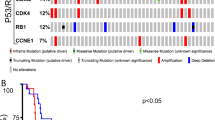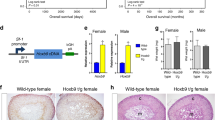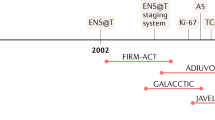Abstract
Adrenocortical carcinoma (ACC) is a rare cancer with poor prognosis. Pan-genomic analyses identified p53/Rb and WNT/β-catenin signaling pathways as main contributors to the disease. However, isolated β-catenin constitutive activation failed to induce malignant progression in mouse adrenocortical tumors. Therefore, there still was a need for a relevant animal model to study ACC pathogenesis and to test new therapeutic approaches. Here, we have developed a transgenic mice model with adrenocortical specific expression of SV40 large T-antigen (AdTAg mice), to test the oncogenic potential of p53/Rb inhibition in the adrenal gland. All AdTAg mice develop large adrenal carcinomas that eventually metastasize to the liver and lungs, resulting in decreased overall survival. Consistent with ACC in patients, adrenal tumors in AdTAg mice autonomously produce large amounts of glucocorticoids and spontaneously activate WNT/β-catenin signaling pathway during malignant progression. We show that this activation is associated with downregulation of secreted frizzled related proteins (Sfrp) and Znrf3 that act as inhibitors of the WNT signaling. We also show that mTORC1 pathway activation is an early event during neoplasia expansion and further demonstrate that mTORC1 pathway is activated in ACC patients. Preclinical inhibition of mTORC1 activity induces a marked reduction in tumor size, associated with induction of apoptosis and inhibition of proliferation that results in normalization of corticosterone plasma levels in AdTAg mice. Altogether, these data establish AdTAg mice as the first preclinical model for metastatic ACC.
This is a preview of subscription content, access via your institution
Access options
Subscribe to this journal
Receive 50 print issues and online access
$259.00 per year
only $5.18 per issue
Buy this article
- Purchase on Springer Link
- Instant access to full article PDF
Prices may be subject to local taxes which are calculated during checkout







Similar content being viewed by others
References
Allolio B, Fassnacht M . Clinical review: adrenocortical carcinoma: clinical update. J Clin Endocrinol Metab 2006; 91: 2027–2037.
Abiven G, Coste J, Groussin L, Anract P, Tissier F, Legmann P et al. Clinical and biological features in the prognosis of adrenocortical cancer: poor outcome of cortisol-secreting tumors in a series of 202 consecutive patients. J Clin Endocrinol Metab 2006; 91: 2650–2655.
Baudin E . Adrenocortical carcinoma. Endocrinol Metab Clin North Am 2015; 44: 411–434.
Else T, Kim AC, Sabolch A, Raymond VM, Kandathil A, Caoili EM et al. Adrenocortical carcinoma. Endocr Rev 2014; 35: 282–326.
Faillot S, Assie G . ENDOCRINE TUMOURS: The genomics of adrenocortical tumors. Eur J Endocrinol Eur Fed Endocr Soc 2016; 174: R249–R265.
Berthon A, Sahut-Barnola I, Lambert-Langlais S, de Joussineau C, Damon-Soubeyrand C, Louiset E et al. Constitutive beta-catenin activation induces adrenal hyperplasia and promotes adrenal cancer development. Hum Mol Genet 2010; 19: 1561–1576.
Heaton JH, Wood MA, Kim AC, Lima LO, Barlaskar FM, Almeida MQ et al. Progression to adrenocortical tumorigenesis in mice and humans through insulin-like growth factor 2 and β-catenin. Am J Pathol 2012; 181: 1017–1033.
Drelon C, Berthon A, Ragazzon B, Tissier F, Bandiera R, Sahut-Barnola I et al. Analysis of the role of Igf2 in adrenal tumour development in transgenic mouse models. PloS One 2012; 7: e44171.
Drelon C, Berthon A, Val P . Adrenocortical cancer and IGF2: is the game over or our experimental models limited? J Clin Endocrinol Metab 2013; 98: 505–507.
Hisada M, Garber JE, Fung CY, Fraumeni JF, Li FP . Multiple primary cancers in families with Li-Fraumeni syndrome. J Natl Cancer Inst 1998; 90: 606–611.
Ribeiro RC, Sandrini F, Figueiredo B, Zambetti GP, Michalkiewicz E, Lafferty AR et al. An inherited p53 mutation that contributes in a tissue-specific manner to pediatric adrenal cortical carcinoma. Proc Natl Acad Sci USA 2001; 98: 9330–9335.
Latronico AC, Pinto EM, Domenice S, Fragoso MC, Martin RM, Zerbini MC et al. An inherited mutation outside the highly conserved DNA-binding domain of the p53 tumor suppressor protein in children and adults with sporadic adrenocortical tumors. J Clin Endocrinol Metab 2001; 86: 4970–4973.
Libè R, Groussin L, Tissier F, Elie C, René-Corail F, Fratticci A et al. Somatic TP53 mutations are relatively rare among adrenocortical cancers with the frequent 17p13 loss of heterozygosity. Clin Cancer Res 2007; 13: 844–850.
Reincke M, Karl M, Travis WH, Mastorakos G, Allolio B, Linehan HM et al. p53 mutations in human adrenocortical neoplasms: immunohistochemical and molecular studies. J Clin Endocrinol Metab 1994; 78: 790–794.
Heinze B, Herrmann LJM, Fassnacht M, Ronchi CL, Willenberg HS, Quinkler M et al. Less common genotype variants of TP53 polymorphisms are associated with poor outcome in adult patients with adrenocortical carcinoma. Eur J Endocrinol 2014; 170: 707–717.
Ragazzon B, Libé R, Assié G, Tissier F, Barreau O, Houdayer C et al. Mass-array screening of frequent mutations in cancers reveals RB1 alterations in aggressive adrenocortical carcinomas. Eur J Endocrinol 2014; 170: 385–391.
de Reyniès A, Assié G, Rickman DS, Tissier F, Groussin L, René-Corail F et al. Gene expression profiling reveals a new classification of adrenocortical tumors and identifies molecular predictors of malignancy and survival. J Clin Oncol 2009; 27: 1108–1115.
Giordano TJ, Kuick R, Else T, Gauger PG, Vinco M, Bauersfeld J et al. Molecular classification and prognostication of adrenocortical tumors by transcriptome profiling. Clin Cancer Res 2009; 15: 668–676.
Assie G, Letouze E, Fassnacht M, Jouinot A, Luscap W, Barreau O et al. Integrated genomic characterization of adrenocortical carcinoma. Nat Genet 2014; 46: 607–612.
Zheng S, Cherniack AD, Dewal N, Moffitt RA, Danilova L, Murray BA et al. Comprehensive pan-genomic characterization of adrenocortical carcinoma. Cancer Cell 2016; 29: 723–736.
Kananen K, Markkula M, Mikola M, Rainio EM, McNeilly A, Huhtaniemi I . Gonadectomy permits adrenocortical tumorigenesis in mice transgenic for the mouse inhibin alpha-subunit promoter/simian virus 40 T-antigen fusion gene: evidence for negative autoregulation of the inhibin alpha-subunit gene. Mol Endocrinol Baltim Md 1996; 10: 1667–1677.
Ragazzon B, Lefrançois-Martinez A-M, Val P, Sahut-Barnola I, Tournaire C, Chambon C et al. Adrenocorticotropin-dependent changes in SF-1/DAX-1 ratio influence steroidogenic genes expression in a novel model of glucocorticoid-producing adrenocortical cell lines derived from targeted tumorigenesis. Endocrinology 2006; 147: 1805–1818.
Tissier F, Aubert S, Leteurtre E, Al Ghuzlan A, Patey M, Decaussin M et al. Adrenocortical tumors: improving the practice of the Weiss system through virtual microscopy: a National Program of the French Network INCa-COMETE. Am J Surg Pathol 2012; 36: 1194–1201.
Lambert-Langlais S, Pointud J-C, Lefrançois-Martinez A-M, Volat F, Manin M, Coudoré F et al. Aldo keto reductase 1B7 and prostaglandin F2alpha are regulators of adrenal endocrine functions. PloS One 2009; 4: e7309.
Hershkovitz L, Beuschlein F, Klammer S, Krup M, Weinstein Y . Adrenal 20alpha-hydroxysteroid dehydrogenase in the mouse catabolizes progesterone and 11-deoxycorticosterone and is restricted to the X-zone. Endocrinology 2007; 148: 976–988.
Romero DG, Yanes LL, de Rodriguez AF, Plonczynski MW, Welsh BL, Reckelhoff JF et al. Disabled-2 is expressed in adrenal zona glomerulosa and is involved in aldosterone secretion. Endocrinology 2007; 148: 2644–2652.
Tissier F, Louvel A, Grabar S, Hagnéré A-M, Bertherat J, Vacher-Lavenu M-C et al. Cyclin E correlates with malignancy and adverse prognosis in adrenocortical tumors. Eur J Endocrinol 2004; 150: 809–817.
Beuschlein F, Weigel J, Saeger W, Kroiss M, Wild V, Daffara F et al. Major prognostic role of Ki67 in localized adrenocortical carcinoma after complete resection. J Clin Endocrinol Metab 2015; 100: 841–849.
Drelon C, Berthon A, Mathieu M, Ragazzon B, Kuick R, Tabbal H et al. EZH2 is overexpressed in adrenocortical carcinoma and is associated with disease progression. Hum Mol Genet 2016; 25: 2789–2800.
Libé R, Bertherat J . Molecular genetics of adrenocortical tumours, from familial to sporadic diseases. Eur J Endocrinol 2005; 153: 477–487.
Gaujoux S, Grabar S, Fassnacht M, Ragazzon B, Launay P, Libé R et al. β-catenin activation is associated with specific clinical and pathologic characteristics and a poor outcome in adrenocortical carcinoma. Clin Cancer Res 2011; 17: 328–336.
Ragazzon B, Libé R, Gaujoux S, Assié G, Fratticci A, Launay P et al. Transcriptome analysis reveals that p53 and {beta}-catenin alterations occur in a group of aggressive adrenocortical cancers. Cancer Res 2010; 70: 8276–8281.
Berthon A, Sahut-Barnola I, Lambert-Langlais S, de Joussineau C, Damon-Soubeyrand C, Louiset E et al. Constitutive beta-catenin activation induces adrenal hyperplasia and promotes adrenal cancer development. Hum Mol Genet 2010; 19: 1561–1576.
Bernichtein S, Petretto E, Jamieson S, Goel A, Aitman TJ, Mangion JM et al. Adrenal gland tumorigenesis after gonadectomy in mice is a complex genetic trait driven by epistatic loci. Endocrinology 2008; 149: 651–661.
Surana R, Sikka S, Cai W, Shin EM, Warrier SR, Tan HJG et al. Secreted frizzled related proteins: Implications in cancers. Biochim Biophys Acta 2014; 1845: 53–65.
Heikkila M, Peltoketo H, Leppaluoto J, Ilves M, Vuolteenaho O, Vainio S . Wnt-4 deficiency alters mouse adrenal cortex function, reducing aldosterone production. Endocrinology 2002; 143: 4358–4365.
Gibb N, Lavery DL, Hoppler S . sfrp1 promotes cardiomyocyte differentiation in Xenopus via negative-feedback regulation of Wnt signalling. Dev Camb Engl 2013; 140: 1537–1549.
Yamamura S, Kawakami K, Hirata H, Ueno K, Saini S, Majid S et al. Oncogenic functions of secreted Frizzled-related protein 2 in human renal cancer. Mol Cancer Ther 2010; 9: 1680–1687.
Sun Y, Zhu D, Chen F, Qian M, Wei H, Chen W et al. SFRP2 augments WNT16B signaling to promote therapeutic resistance in the damaged tumor microenvironment. Oncogene 2016; 35: 4321–4334.
Feng Z, Zhang H, Levine AJ, Jin S . The coordinate regulation of the p53 and mTOR pathways in cells. Proc Natl Acad Sci USA 2005; 102: 8204–8209.
Paglin S, Yahalom J . Pathways that regulate autophagy and their role in mediating tumor response to treatment. Autophagy 2006; 2: 291–293.
Doghman M, El Wakil A, Cardinaud B, Thomas E, Wang J, Zhao W et al. Regulation of insulin-like growth factor-mammalian target of rapamycin signaling by microRNA in childhood adrenocortical tumors. Cancer Res 2010; 70: 4666–4675.
Doghman M, Lalli E . Efficacy of the novel dual PI3-kinase/mTOR inhibitor NVP-BEZ235 in a preclinical model of adrenocortical carcinoma. Mol Cell Endocrinol 2012; 364: 101–104.
De Martino MC, van Koetsveld PM, Feelders RA, Sprij-Mooij D, Waaijers M, Lamberts SWJ et al. The role of mTOR inhibitors in the inhibition of growth and cortisol secretion in human adrenocortical carcinoma cells. Endocr Relat Cancer 2012; 19: 351–364.
Papotti M, Libè R, Duregon E, Volante M, Bertherat J, Tissier F . The Weiss score and beyond—histopathology for adrenocortical carcinoma. Horm Cancer 2011; 2: 333–340.
Berruti A, Fassnacht M, Haak H, Else T, Baudin E, Sperone P et al. Prognostic role of overt hypercortisolism in completely operated patients with adrenocortical cancer. Eur Urol 2014; 65: 832–838.
Assié G, Guillaud-Bataille M, Ragazzon B, Bertagna X, Bertherat J, Clauser E . The pathophysiology, diagnosis and prognosis of adrenocortical tumors revisited by transcriptome analyses. Trends Endocrinol Metab 2010; 21: 325–334.
Juhlin CC, Goh G, Healy JM, Fonseca AL, Scholl UI, Stenman A et al. Whole-exome sequencing characterizes the landscape of somatic mutations and copy number alterations in adrenocortical carcinoma. J Clin Endocrinol Metab 2015; 100: E493–E502.
Baudin E . Endocrine Tumor Board of Gustave Roussy. Adrenocortical carcinoma. Endocrinol Metab Clin North Am 2015; 44: 411–434.
Ahuja D, Sáenz-Robles MT, Pipas JM . SV40 large T antigen targets multiple cellular pathways to elicit cellular transformation. Oncogene 2005; 24: 7729–7745.
Bocchetta M, Eliasz S, De Marco MA, Rudzinski J, Zhang L, Carbone M . The SV40 large T antigen-p53 complexes bind and activate the insulin-like growth factor-I promoter stimulating cell growth. Cancer Res 2008; 68: 1022–1029.
Fassnacht M, Terzolo M, Allolio B, Baudin E, Haak H, Berruti A et al. Combination chemotherapy in advanced adrenocortical carcinoma. N Engl J Med 2012; 366: 2189–2197.
Fassnacht M, Berruti A, Baudin E, Demeure MJ, Gilbert J, Haak H et al. Linsitinib (OSI-906) versus placebo for patients with locally advanced or metastatic adrenocortical carcinoma: a double-blind, randomised, phase 3 study. Lancet Oncol 2015; 16: 426–435.
Feng Z, Levine AJ . The regulation of energy metabolism and the IGF-1/mTOR pathways by the p53 protein. Trends Cell Biol 2010; 20: 427–434.
Martino MCD, Feelders RA, de Herder WW, van Koetsveld PM, Dogan F, Janssen JAMJL et al. Characterization of the mTOR pathway in human normal adrenal and adrenocortical tumors. Endocr Relat Cancer 2014; 21: 601–613.
Naing A, Kurzrock R, Burger A, Gupta S, Lei X, Busaidy N et al. Phase I trial of cixutumumab combined with temsirolimus in patients with advanced cancer. Clin Cancer Res 2011; 17: 6052–6060.
Gangadhar TC, Cohen EEW, Wu K, Janisch L, Geary D, Kocherginsky M et al. Two drug interaction studies of sirolimus in combination with sorafenib or sunitinib in patients with advanced malignancies. Clin Cancer Res 2011; 17: 1956–1963.
Fraenkel M, Gueorguiev M, Barak D, Salmon A, Grossman AB, Gross DJ . Everolimus therapy for progressive adrenocortical cancer. Endocrine 2013; 44: 187–192.
Acknowledgements
We thank Lucile Mounier for technical assistance and Sandrine Plantade, Khirredine Ouchen and Philippe Mazuel for animal care. Tissue analyses were performed at Anipath Clermont core facility. This work was supported by Université Blaise Pascal, Université d′Auvergne, CNRS, INSERM, Agence National de la Recherche (grant ANR-14-CE12-0007), grants from Fondation ARC pour la Recherche sur le Cancer (PJA 20141201894) and from La Fondation de France. We thank the Cochin tumor bank and COMETE (COrtico MEdullo Tumeurs Endocrines) network for the provision of ACA and ACC tissue samples.
Author information
Authors and Affiliations
Corresponding authors
Ethics declarations
Competing interests
The authors declare no conflict of interest.
Additional information
Supplementary Information accompanies this paper on the Oncogene website
Rights and permissions
About this article
Cite this article
Batisse-Lignier, M., Sahut-Barnola, I., Tissier, F. et al. P53/Rb inhibition induces metastatic adrenocortical carcinomas in a preclinical transgenic model. Oncogene 36, 4445–4456 (2017). https://doi.org/10.1038/onc.2017.54
Received:
Revised:
Accepted:
Published:
Issue Date:
DOI: https://doi.org/10.1038/onc.2017.54
This article is cited by
-
Advances in translational research of the rare cancer type adrenocortical carcinoma
Nature Reviews Cancer (2023)
-
FLCN-Driven Functional Adrenal Cortical Carcinoma with High Mitotic Tumor Grade: Extending the Endocrine Manifestations of Birt-Hogg-Dubé Syndrome
Endocrine Pathology (2023)
-
Loss of SUMO-specific protease 2 causes isolated glucocorticoid deficiency by blocking adrenal cortex zonal transdifferentiation in mice
Nature Communications (2022)
-
HOX genes promote cell proliferation and are potential therapeutic targets in adrenocortical tumours
British Journal of Cancer (2021)
-
Adjuvant platinum-based chemotherapy in radically resected adrenocortical carcinoma: a cohort study
British Journal of Cancer (2021)



